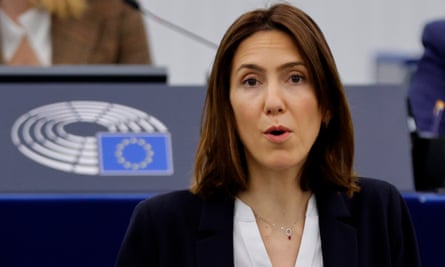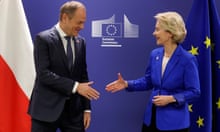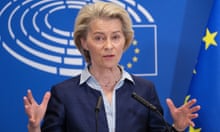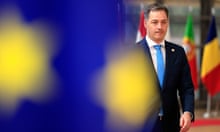The former UK prime minister Theresa May’s proposal for an EU-wide defence treaty needs to be revisited urgently, the leader of Emmanuel Macron’s political group in Brussels has said, as the shadow foreign secretary, David Lammy, said his party would seek such a deal in government.
If climate breakdown was top of Ursula von der Leyen’s last mandate as European Commission president, defence must now be the number one priority for the next five years of EU policymaking, said Valérie Hayer, the recently selected head of the Renew group, the third-biggest voting bloc in the European parliament.
“I know that in Theresa May’s time, there was a defence treaty on the table. I think that would be very, very useful. We already have close cooperation, but it would be very, very useful to put this subject back on the table,” she said. “One of our priorities is to accelerate European defence.”
Her remarks were made just before Lammy confirmed that, if elected, Labour would seek a security deal with the EU because of the war in Ukraine. “My party is proposing a new EU-UK security pact. And it’s a pact that is effectively built on the fact that we obviously have war here in Europe,” he told the Munich Security Conference on Sunday.
May was keen during the Brexit negotiations to continue collaboration with the EU but her successor, Boris Johnson, opted to eschew a formal deal over the role of the European court of justice.
Many within the EU, including Hayer, believe a security arrangement with the UK is desirable and believe talks could begin quickly if Labour’s Keir Starmer becomes prime minister later this year.
“Because of what has happened since Brexit with the war in Ukraine, I think we can actually move in this direction,” Hayer said.

Lammy told the Munich conference it was “absolutely fundamental that the United Kingdom and Europe have the closest of relationships and the Brexit era is over”.
However, the EU remains divided on many security and defence questions, with Hungary having threatened to block funds for Ukraine and other countries happy to let Germany do the heavy lifting.
Von der Leyen has called on the EU to subsidise defence production, but Hayer says the Renew group wants to go further and see the establishment of a “sovereignty fund”, already mooted by the commission chief last September.
“We need the European Commission to make this a top priority. The status quo is not an option today, so we really need to make sure that this is politically identified. We need to step up the pace on these issues. There is too little coordination between the 27 member states on these issues,” she said.
Hayer’s own future will be determined by the European elections in June when polls predict far-right parties such as Alternative für Deutschland in Germany and Marine Le Pen’s Rassemblement National in France to make significant electoral gains, shifting the composition of the world’s largest parliament to the right and away from centrists such as Renew and the Greens, the third- and fourth-largest groupings.
Renew’s strategy is to fracture the parties on the right, particularly the European Conservatives and Reformists group (ECR), which was set up at the behest of David Cameron in 2009 as a rival to the largest voting bloc, the European People’s party (EPP), which is home to most centre-right parties in Europe.
In the past 14 years the ECR has steadily lurched to the right and in the past month shocked many by accepting France’s second far-right party, Reconquête, led by Éric Zemmour, as a member, pushing the group to the extreme right.
While this may play into centrists’ hands and more parties refuse to vote with ECR members in the new parliament, Hayer is taking nothing for granted.
“If we go back five years, in 2019 no one was expecting us, we’d give up. But we came to the European parliament in force and broke the duopoly between the EPP and the Socialists,” she said.
She added that voters had seen nothing yet and Renew was putting the finishing touches to a new communications strategy to tackle the “lies” and “hypocrisy” of the far right.
“We’re very, very mobilised … We’re going to be very aggressive and determined, both to promote our track record and to make the most of it,” she said.
She said that on migration she would campaign hard to expose the claims of the right, pointing to the cost the UK has paid for listening to the lies about migration during the Brexit campaign.
“With Brexit you experienced populism; people who are lying, politicians who are liars. And at the end you pay the price: you are not in the EU any more, inflation is higher, migration is double what you had before Brexit and you have huge queues of trucks at the border.”
Citing recent events in Germany, she said the mission was to get the silent majority out to vote, and that the more lies that were exposed, the more motivated voters would be.
“Civil society is very active. We see it right now in Germany with the demonstrations against the AfD’s Dexit project to expel German citizens of foreign origin.
“In France, we’re also seeing the rise of the extreme right. So we’ll be waging our battle in the European election campaign with the same determination and the same objective,” she said.










